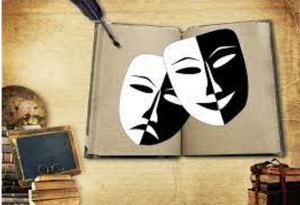Welcome to the Drama and Theatre Studies Department

Department staff
Ms A Thorpe – Subject Leader: Drama & Theatre Studies / Director of Arts
Introduction
“There is no world without theatre, our society is absolutely saturated with drama.”
Edward Bond
Drama challenges our perceptions about the world we live in and ourselves. The aim is that all learners are stimulated into new insights and understandings through the safe and creative context of building the world of a play as: performers, directors and designers of theatre. Through studying Drama, students should be equipped with the cultural capital and confidence to succeed in a competitive world, as engaged and informed theatre spectators. An integral aim is to provide knowledge as a foundation for building practical skills in making, performing and appreciating the value that theatre holds in society. Knowledge provides learners with access to the wide range of plays that they will encounter from different time periods and the study of key theatrical styles helps students to understand the frameworks from which practitioners of theatre communicate meaning to an audience. The choice of theatre that pupils encounter is underpinned by the objective for young people to engage and empathise with those outside their own social and cultural experience. As students grow in confidence, knowledge and skill as collaborative theatre makers, they should be equipped to express their own creative ideas effectively through the medium of drama. Embedded throughout the curriculum is the opportunity to build both personal and academic qualities, which will empower students to succeed not only in drama but also into their next steps beyond school life.
Key Stage 4
Students follow the AQA GCSE Drama specification
GCSE drama provides the opportunity to explore a range of skills involved in creating and performing drama. This includes the creation of original work, as well as exploring plays written by other people, within class and through attending live professional theatre.
Assessment
Understanding Drama – Written Exam: 1 hour 45 mins (40% of GCSE)
- Section A: Multiple-choice questions on theatre roles and terminology.
- Section B: Four questions on how to stage aspects of the play A Taste of Honey by Shelagh Delaney
- Section C: Analysis of a live theatre production seen.
Devising Drama – Practical Exam (40% of GCSE)
In groups devise a play in a chosen style of theatre, inspired by a stimulus. Students must also produce an individual devising log about the process of devising a play for performance.
Texts in Practice – Practical Exam (20% of GCSE)
Acting skills are assessed in the performance of two extracts (scenes) from one play.
Key Stage 5
Students follow the AQA A Level in Drama and Theatre Studies specification
Students deepen their understanding of drama through learning to research, follow and emulate both the methodologies for making a piece of theatre and the aesthetic look (stylistic features) of specific theatre practitioners for both practical examinations. Five full plays that span different time periods and styles are studied from the point of view of a performer, director and all the designer roles within theatre. All students at this more advanced level are expected to train and specialise in at least one specific theatrical role: Actor, Designer and/or Director for the practical NEA work. Demand increases as at this stage as students must be confident in their written communication in both analysing and evaluating the work of all three theatrical roles and also in developing their own ideas as to how each of these distinct areas will work in relation to the plays studied.
Assessment
Drama and Theatre (Written Examination 40%)
A – One question from the play Antigone, by Sophocles
B –Three questions from the play Our Country’s Good, by Timberlake Wertenbaker
C- One Question about a Live Theatre Production seen
Creating Original Drama (30%)
Devised performance influenced by the theatre practitioner Steven Berkoff and a working notebook about the process of making and performing the piece of theatre created.
Making Theatre (30%)
Practical exploration of three extracts (scenes) from contrasting plays in terms of style and time period. One of the extracts is rehearsed and performed in the style of a theatre practitioner for a visiting examiner. Students also produce a reflective report about the process.

